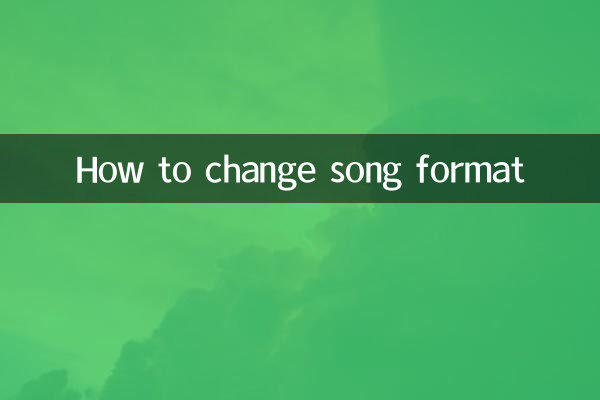How to change song format
In the era of digital music, song format conversion has become a need for many users. Whether it is to be compatible with different devices, to save storage space, or to improve sound quality, it is particularly important to master the method of converting song formats. This article will introduce you in detail how to change the song format and provide structured data for you to get started quickly.
1. Why do you need to change the song format?

Song format conversion usually occurs for several reasons:
1.Device compatibility: Different devices may support different audio formats. For example, some car stereos only support MP3 format, while high-quality audio lovers may prefer FLAC format.
2.storage space: Lossless formats such as FLAC or WAV take up a lot of space. Converting to lossy formats such as MP3 can save storage space.
3.Sound quality requirements: Different formats have different sound quality performance, and users may need to choose the appropriate format according to the occasion.
2. Common audio formats and their characteristics
| Format | type | Features | Applicable scenarios |
|---|---|---|---|
| MP3 | lossy | Small file size and strong compatibility | Daily playback, mobile devices |
| FLAC | Lossless | High sound quality, large files | High quality requirements |
| WAV | Lossless | Very high sound quality, huge file size | Professional audio editing |
| AAC | lossy | Better sound quality than MP3, smaller file size | Apple devices, streaming media |
| OGG | lossy | Open source format, good sound quality | Open source software, games |
3. How to change the song format?
There are many ways to change the format of a song, here are a few common tools and methods:
1. Use online conversion tools
Online tools such as OnlineAudioConverter, Convertio, etc. do not need to install software, just upload files directly for conversion. Suitable for occasional users.
2. Use professional audio software
Software such as Audacity, Adobe Audition, etc. not only support format conversion, but also audio editing. Suitable for users with professional needs.
3. Use desktop conversion software
Software such as Format Factory, Any Audio Converter, etc. support batch conversion and are powerful. Suitable for users who switch frequently.
4. Use command line tools
For technology enthusiasts, you can use command line tools such as FFmpeg to convert formats with high flexibility.
4. Hot Topics: Audio format trends in the past 10 days
According to the search data on the entire Internet, the hot topics about audio formats in the past 10 days mainly focus on the following points:
1.Popularization of lossless sound quality: As streaming media platforms such as Tidal and Apple Music launch lossless sound quality options, FLAC and ALAC formats have received more attention.
2.The rise of open source formats: OGG and Opus formats have become increasingly popular in the gaming and open source communities due to their open source nature.
3.AI audio repair: Using AI technology to restore low-quality MP3 files to high-quality formats has become a hot topic.
5. Things to note when converting song formats
1.Loss of sound quality: Converting from a lossy format to another lossy format will cause further degradation in sound quality. It is recommended to convert from a lossless format as much as possible.
2.Copyright issues: Make sure you have the rights to convert and distribute the target files to avoid copyright infringement.
3.Metadata retention: Pay attention to retaining the song’s metadata (such as artist and album information) when converting, as some tools will lose this information.
6. Summary
Converting song formats is a simple but practical skill. Through the tools and methods introduced in this article, you can easily cope with the audio needs in different scenarios. Whether it's for compatibility, storage space or sound quality, choosing the right tools and formats can take your music experience to the next level.

check the details

check the details